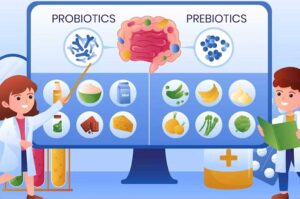More individuals are having digestive issues in our busy world of processed foods and concerns. The appropriate treatment for bloating, constipation, indigestion, or other digestive issues can make you feel better for a long period without any side effects. This article offers five natural gut-health remedies. These basic health steps can improve your health.
1. Eat Extra Fibre

Fiber-rich meals help digestion. Making poop bulkier helps pass and prevents constipation. Fibres can be solids or suspensions. Water-soluble fibres soften excrement, making it easier to pass. This fibre doesn’t break down in water but thickens faeces, speeding digestion.
As we know high fiber meals including beans, broccoli, carrots, spinach, and whole grains are beneficial. Quinoa, brown rice, and oats are nutritious. These foods feed intestinal flora, increasing toilet trips. These bacteria digest food, absorb nutrients, and suppress other bacteria, making them essential.
2. Stay Hydrated

Water aids digestion by delivering nutrients from food. Adequate water prevents constipation and softens faeces. Water deficiency can cause stomachaches and firm stools.
Peppers, cucumbers, melons, and oranges are water-rich foods. Ginger and peppermint drinks can soothe your stomach and hydrate you. Try to consume eight glasses of water daily. Your needs may vary depending on your schedule, weather, and health.
3. Be Mindful of Your Diet

Mindful eating requires paying attention to what and how you consume. Eat slowly and chew well to employ this strategy. When dining, avoid TVs and phones. If you want to learn how to control your eating, this is a great place to start.
Chewing well helps your stomach digest food. If you eat quickly, too much food might damage your stomach and cause indigestion. Saliva enzymes can break down food while you’re mindfully eating. The digestive process begins here.
4. Use Probiotics and Prebiotics

Live probiotics improve gut health. Prebiotics are proteins your body can’t digest that feed these microorganisms. Good digestion requires gut-bacteria equilibrium. This aids digestion, nutrient absorption, and disease protection.
Fermented foods like yoghurt, kefir, cabbage, kimchi, miso, and others contain probiotics. These foods provide excellent gut flora, which aids digestion, health, and happiness. Garlic, onions, leeks, artichokes, and bananas contain prebiotics. Prebiotics feed and cultivate helpful microorganisms, keeping the body healthy.
Food contains probiotics, but you may want to take a pill if your gut is sick or you’re on medicines. A vitamin with a mix of them provides health benefits from all of them.
5. Move Frequently

Regular exercise is healthy for your body and gut. Working exercise increases blood flow to your digestive tract, speeding up meal digestion. This can prevent gas, bloating, and bathroom issues.
During peristalsis, your gut muscles automatically tighten, and simple exercises like walking aid digestion. Since yoga mainly involves bending, it might help your stomach and reduce bloating. Weight control and regular exercise can also help your stomach feel better and minimize acid reflux risk.
Work out for 30 minutes seven days a week. Better health comes from moving more. A short walk, yoga, or jog can get you moving.
6. Manage Stress Effectively

Stress alters the gut significantly. This line connects the intestines and brain. Concern can cause IBS, indigestion, stomach cramps, and diarrhea.
Stress management is crucial for intestinal health. Mindfulness, meditation, and deep breathing can reduce stress. The digestive system benefits from relaxation. Meditation helps. Deep breathing relieves tension and increases airflow.
Daily exercise releases endorphins, which make you feel good, which might help you manage stress. Relaxing from daily stress is healthy for your gut. You can do this by playing sports, going outside, or relaxing.
7. Avoid Prepared Foods

Many prepared foods are heavy in sugar, unhealthy fats, and artificial additives that might harm your digestive system. These foods may worsen acid reflux and IBS, slow digestion, and cause flatulence.
Processed foods lack fibre, which is unhealthy. Avoid boxed snacks and meals and consume more fresh foods. Nuts, avocados, olive oil, fresh produce, and whole grains provide healthful fats. Lots of these are gut-healthy.
Make reading grocery bags a habit. Avoid products with many components, especially sugar or artificial substances. Cooking at home lets you choose healthier, stomach-friendly foods.
8. Frequently Eat Small Meals

Large meals can cause gas, bloating, and pain. A variety of modest meals throughout the day will aid digestion and prevent stomach bloating.
Smaller meals are more accessible for your gut to digest, keeping you energized all day. High and low blood sugar might make you fatigued and grumpy, so this helps stabilize blood sugar.
Protein, healthy fats, and complex carbs should be present in each meal. Think about eating three times a day. This helps your stomach and makes you feel full and healthy.
9. Add Stomach Enzymes

Digestive enzymes are proteins that assist the body in using food nutrients. However, some individuals lack these enzymes, which can impair nutrient absorption and produce gas and bloating.
Pineapple, papaya, and mango include enzymes that assist your body create stomach enzymes. Papaya and pineapple enzymes digest protein. Bromelain-containing pineapple also does this. Eat these veggies alone, in salads, or as snacks.
Consider taking an enzyme pill if you suspect you may not have enough for your stomach. These supplements help you absorb and break down nutrients better, which can ease gastroenteritis and enhance your health.
10. Rest Sufficiently

Sleep improves intestinal health and overall well-being. Sleep deprivation can cause heartburn, acid reflux, and weight gain. When you sleep, your body accomplishes vital digestive functions. Repairing tissues and controlling hunger and desire chemicals are biological functions.
Sleep 7–9 hours per night for proper physical function. A peaceful evening routine, going to bed simultaneously, and not eating big meals before bed will help you sleep. After that, your gut and overall health will improve.
Conclusion
Better gut health doesn’t necessarily require drastic changes or medication. Add these ten natural practices to your daily routine to improve digestive problems organically and feel healthier. These methods improve gut health in different ways. Using them together can make a difference.
Remember that each body is different. Therefore, finding the best way to combine these strategies may take time. If you work hard, you can enhance intestinal health, which boosts vitality, happiness, and quality of life.


